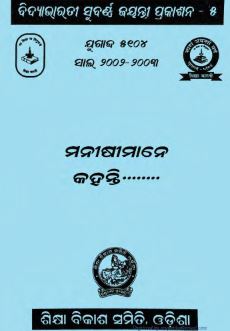Manisimane Kahanti, a significant contribution to Odia educational literature, was published by Siksha Bikas Samiti in 2002. This book serves as a vital resource for educators, students, and researchers interested in the nuances of educational philosophy and practice within the Odia-speaking community.
At its core, “Manisimane Kahanti” delves into the fundamental principles of teaching and learning, emphasizing the profound connection between the teacher and the student. The title itself, which translates to “What the Mind Says,” signifies the inspiration drawn from the mental and emotional dimensions of education. It echoes the belief that effective education goes beyond mere rote learning; it encompasses understanding, empathy, and the cultivation of critical thinking skills.
The book is structured to serve as a comprehensive guide for teachers, providing them with insights into various pedagogical approaches rooted in the cultural and social context of Odisha. One of the book’s primary goals is to enhance the teacher’s role as a facilitator of learning, rather than merely a transmitter of knowledge. It highlights the importance of creating a collaborative learning environment where students feel empowered to express their thoughts and ideas.
Throughout “Manisimane Kahanti,” the authors discuss a range of topics related to educational theory and practice. From the significance of student engagement to the ethical responsibilities of educators, the book encourages a reflective approach to teaching. It provides practical strategies for teachers to assess student understanding and adapt their methods to meet diverse learning needs. The emphasis on formative evaluation is notable, with suggestions for ongoing assessment that informs instruction and promotes continuous improvement.
The book also addresses the broader implications of educational reform in Odisha, encouraging teachers to be agents of change within their communities. By fostering a sense of responsibility towards social development, “Manisimane Kahanti” positions educators as pivotal figures in shaping not just academic outcomes but also the civic consciousness of their students. It argues that education should cultivate both individual potential and collective well-being, urging teachers to integrate lessons that inspire social awareness and action.
Moreover, “Manisimane Kahanti” is enriched with case studies and anecdotes from experienced educators, which exemplify successful teaching practices and highlight the challenges faced in the classroom. These real-world examples serve as a source of inspiration and practical guidance for both novice and veteran teachers, providing a deeper understanding of the complexities of the teaching profession.
A critical aspect of the book is its accessibility; it’s written in clear and engaging Odia, making the content approachable for a wide audience. The authors have taken care to include culturally relevant references and idiomatic expressions that resonate with Odia readers, reinforcing the idea that education should be contextually grounded.
In summary, “Manisimane Kahanti” stands out as a notable educational book in the Odia language, advocating for a transformative approach to teaching and learning. By prioritizing the teacher’s role in nurturing a thoughtful and responsive educational environment, it aims to inspire a new generation of educators who are committed to fostering holistic development in their students and communities. The book remains a crucial text for anyone involved in the field of education in Odisha, guiding them toward more meaningful and impactful teaching practices.
Books Info
| Books name | Manisimane Kahanti…./ମନିଷୀମାନେ କହନ୍ତି |
| Author | Siksha Bikas Samiti |
| No Of pages | 30 |
| Publisher | Shiksya Bikasha Samiti |
| Publication | 2002 |
| Printed At | Skynet |
| Distributor | NA |

